Ashwagandha (Withania somnifera, fam. Solanaceae) is commonly known as “Indian Winter cherry” or “Indian Ginseng”. It is one of the most important herb of Ayurveda (the traditional system of medicine in India) used for millennia as a Rasayana for its wide ranging health benefits. Rasayana is described as an herbal or metallic preparation that promotes a youthful state of physical and mental health and expands happiness. These types of remedies are given to small children as tonics, and are also taken by the middle-aged and elderly to increase longevity.
The biologically active chemical constituents of Withania somnifera (WS) include alkaloids (isopelletierine, anaferine, cuseohygrine, anahygrine, etc.), steroidal lactones (withanolides, withaferins) and saponins . Sitoindosides and acylsterylglucosides in Ashwagandha are anti-stress agents.
The root of Ashwagandha is regarded as tonic, aphrodisiac, narcotic, diuretic, anthelmintic, astringent, thermogenic and stimulant. The root smells like horse (“ashwa”), that is why it is called Ashwagandha (on consuming it gives the power of a horse).
It is commonly used in emaciation of children (when given with milk, it is the best tonic for children), debility from old age, rheumatism, vitiated conditions of vata, leucoderma, constipation, insomnia, nervous breakdown, goiter etc.
USES & EFFECTS OF ASHWAGANDHA
Effect on swimming performance
Ashwagandha was shown to increase swimming performance in rats as judged by increase in swimming time during physical endurance test.
Anti-ulcerogenic effect
Ashwagandha was found to be useful in the prevention of stress-induced ulcers of the gastrointestinal tract.
Effect on leucocytosis
Ashwagandha given to a group of mice with milk injection produced reduction in leucocytosis.
v. Anabolic effects:
There was a significant increase in the body weights of the Ashwagandha treated group as compared to control for a period of 3 months in rats.
vi.Anti-inflammatory effect due to Withaferin:
Withaferin A and 3-b-hydroxy-2,3-dihydrowithanolide F isolated from Withania somnifera show promising antibacterial, antitumoral, immunomodulating and anti-inflammatory properties (Budhiraja and Sudhir, 1987).
Anti-arthritic effect:
Ashwagandha is an analgesic that soothes nervous system from pain response (Twajj et al., 1989). The powerful anti-arthritic properties (Singh et al. 1984, 1986) of Ashwagandha are now widely accepted and documented; it is furthermore found to be
- Health Benefits:
-
- Stress and Anxiety: Ashwagandha is known for its stress-reducing properties. It may help lower cortisol levels, which are associated with stress.
-
-
- Improved Sleep: Some people use Ashwagandha to improve the quality of their sleep and manage insomnia.
- Anti-Inflammatory: It has anti-inflammatory properties and can be used to alleviate inflammation and related conditions.
- Boosting Immunity: Ashwagandha may enhance the immune system, helping the body defend against infections.
- Enhanced Brain Function: It may support cognitive function and memory.
- Energy and Vitality: Ashwagandha is often used to increase energy and stamina.
- Anti-Aging: Some people use it for its potential anti-aging effects.
- Preparation: The root of the Ashwagandha plant is primarily used for medicinal purposes. It can be consumed in various forms, including as a powder, capsule, or extract. It is also sometimes used topically.
- Safety: Ashwagandha is generally considered safe when taken in recommended doses. However, it’s essential to consult with a healthcare professional before using it, especially if you are pregnant, nursing, have underlying health conditions, or are taking medications, as it may interact with certain drugs.
- Modern Research: Ashwagandha has gained popularity in recent years, and modern scientific research has been conducted to explore its potential health benefits. Some studies support its traditional uses, particularly in stress reduction and anxiety management.
- Cautions: While generally safe, excessive intake may lead to side effects such as upset stomach, diarrhea, or nausea. It’s crucial to follow dosing recommendations and consult with a healthcare provider when in doubt.
Ashwagandha is a versatile herb with a long history of use in traditional medicine, and its popularity continues to grow in the modern wellness and health industry for its potential to promote physical and mental well-being.
-
-
FAQS FOR ASHWAGANDHA CAPSULES–
Q.1 What is the best time of day to take ashwagandha capsules?
Most people take ashwagandha as a capsule or powder that can be taken at any time of the day. You may wish to incorporate it into your nightly routine to promote good sleep habits. Alternatively, you may find taking it in the morning suits your routine better.
Q2. How long does ashwagandha last?
How long will ashwagandha remain in my system? There are two types of compounds in ashwagandha—fat-soluble and water-soluble. The water-soluble compounds leave your body between 2-3 days, while the fat-soluble ones may take a month to leave your body.
Q3. Can I take ashwagandha everyday?
Ashwagandha is generally considered safe to take daily in the short term (two to three months). If you’re taking ashwagandha longer than that, it may still be safe for you, but speak with your doctor before starting and while continuing any new supplement routine.
Q4. Why only take ashwagandha for 3 months?
However, the efficacy and safety of long-term ashwagandha use over months or years for stress, anxiety, or sleep is not known. In addition, ashwagandha may have potential adverse effects on the liver and thyroid and might not be safe for people with prostate cancer or those who are pregnant or nursing.
Q5. Can a 14 year old take ashwagandha?
The effects of ashwagandha in teens and young adults is not yet fully known, so it’s impossible at this point to say that ashwaganda is safe for teens. What is known is that it can cause symptoms such as vomiting, dizziness, emotional bluntness, anger, and depression.
Q6. Can I take 2 ashwagandha pills at once?
People with the following health conditions can use Ashwagandha every day: The most effective treatment for improving overall health: Take 1-2 Ashwagandha capsules after breakfast & dinner with warm water or milk
Q7. Can I take ashwagandha at night?
Many people find it beneficial to take Ashwagandha in the evening or before bedtime to leverage its potential relaxing and stress-reducing effects. However, if it has the opposite effect on you, enhancing energy, consider taking it earlier in the day instead.
Q8. Can you take ashwagandha while pregnant?
In some individuals, ashwagandha preparations may cause drowsiness, stomach upset, diarrhea, and vomiting. Although it is rare, there have been a number of cases that link liver injury to ashwagandha supplements. Ashwagandha should be avoided during pregnancy and should not be used while breastfeeding.
- अश्वगंधा का वर्णनअश्वगंधा (विथानिया सोम्निफेरा, पारिवारिक सोलानेसी) को आमतौर पर “इंडियन विंटर चेरी” या “इंडियन जिनसेंग” के रूप में जाना जाता है। यह आयुर्वेद (भारत में चिकित्सा की पारंपरिक प्रणाली) की सबसे महत्वपूर्ण जड़ी-बूटियों में से एक है, जिसका व्यापक स्वास्थ्य लाभों के लिए रसायन के रूप में सहस्राब्दियों से उपयोग किया जाता है। रसायन को एक हर्बल या धातु तैयारी के रूप में वर्णित किया गया है जो शारीरिक और मानसिक स्वास्थ्य की युवा स्थिति को बढ़ावा देता है और खुशी का विस्तार करता है। इस प्रकार के उपचार छोटे बच्चों को टॉनिक के रूप में दिए जाते हैं, और दीर्घायु बढ़ाने के लिए मध्यम आयु वर्ग और बुजुर्गों द्वारा भी किए जाते हैं।विथानिया सोम्नीफेरा (डब्ल्यूएस) के जैविक रूप से सक्रिय रासायनिक घटकों में एल्कलॉइड्स (आइसोपेलेटिएरिन, एनाफेरिन, क्यूसोहाइग्रीन, एनाहाइग्रीन, आदि), स्टेरायडल लैक्टोन (विथेनोलाइड्स, विथेफेरिन) और सैपोनिन शामिल हैं। अश्वगंधा में सिटोइंडोसाइड्स और एसाइलस्टेरिलग्लुकोसाइड्स तनाव-विरोधी एजेंट हैं।
अश्वगंधा की जड़ को टॉनिक, कामोत्तेजक, मादक, मूत्रवर्धक, कृमिनाशक, कसैला, थर्मोजेनिक और उत्तेजक माना जाता है। इसकी जड़ से अश्व (“अश्व”) जैसी गंध आती है, इसीलिए इसे अश्वगंधा कहा जाता है (इसके सेवन से घोड़े जैसी शक्ति मिलती है)।
इसका उपयोग आमतौर पर बच्चों की दुर्बलता (दूध के साथ देने पर यह बच्चों के लिए सबसे अच्छा टॉनिक है), बुढ़ापे से होने वाली दुर्बलता, गठिया, वात की ख़राब स्थिति, ल्यूकोडर्मा, कब्ज, अनिद्रा, तंत्रिका टूटना, गण्डमाला आदि में किया जाता है।
अश्वगंधा के उपयोग एवं प्रभाव
तैराकी के प्रदर्शन पर प्रभाव
शारीरिक सहनशक्ति परीक्षण के दौरान तैराकी के समय में वृद्धि से पता चला कि अश्वगंधा चूहों में तैराकी के प्रदर्शन को बढ़ाता है।
एंटी-अल्सरोजेनिक प्रभाव
अश्वगंधा को गैस्ट्रोइंटेस्टाइनल ट्रैक्ट के तनाव-प्रेरित अल्सर की रोकथाम में उपयोगी पाया गया।
ल्यूकोसाइटोसिस पर प्रभाव
दूध के इंजेक्शन के साथ चूहों के एक समूह को अश्वगंधा देने से ल्यूकोसाइटोसिस में कमी आई।
वी. अनाबोलिक प्रभाव:
चूहों में 3 महीने की अवधि के नियंत्रण की तुलना में अश्वगंधा उपचारित समूह के शरीर के वजन में उल्लेखनीय वृद्धि हुई थी।
विथाफेरिन के कारण सूजनरोधी प्रभाव:
विथानिया सोम्निफेरा से पृथक विथाफेरिन ए और 3-बी-हाइड्रॉक्सी-2,3-डायहाइड्रोविथेनोलाइड एफ आशाजनक जीवाणुरोधी, एंटीट्यूमोरल, इम्यूनोमॉड्यूलेटिंग और एंटी-इंफ्लेमेटरी गुण दिखाते हैं (बुधिराजा और सुधीर, 1987)।
जाओ:
गठिया विरोधी प्रभाव:
अश्वगंधा एक एनाल्जेसिक है जो दर्द प्रतिक्रिया से तंत्रिका तंत्र को शांत करता है (ट्वाज एट अल., 1989)। अश्वगंधा के शक्तिशाली गठियारोधी गुण (सिंह एट अल. 1984, 1986) अब व्यापक रूप से स्वीकार किए जाते हैं और प्रलेखित हैं; यह और भी पाया जाता है
- स्वास्थ्य लाभ:
- तनाव और चिंता: अश्वगंधा अपने तनाव कम करने वाले गुणों के लिए जाना जाता है। यह कोर्टिसोल के स्तर को कम करने में मदद कर सकता है, जो तनाव से जुड़ा होता है।
- बेहतर नींद: कुछ लोग अपनी नींद की गुणवत्ता में सुधार और अनिद्रा को प्रबंधित करने के लिए अश्वगंधा का उपयोग करते हैं।
- सूजन रोधी: इसमें सूजन रोधी गुण होते हैं और इसका उपयोग सूजन और संबंधित स्थितियों को कम करने के लिए किया जा सकता है।
- प्रतिरक्षा को बढ़ावा देना: अश्वगंधा प्रतिरक्षा प्रणाली को बढ़ा सकता है, जिससे शरीर को संक्रमण से बचाने में मदद मिलती है।
- उन्नत मस्तिष्क कार्य: यह संज्ञानात्मक कार्य और स्मृति का समर्थन कर सकता है।
- ऊर्जा और जीवन शक्ति: अश्वगंधा का उपयोग अक्सर ऊर्जा और सहनशक्ति बढ़ाने के लिए किया जाता है।
- एंटी-एजिंग: कुछ लोग इसका उपयोग इसके संभावित एंटी-एजिंग प्रभावों के लिए करते हैं।
- तैयारी: अश्वगंधा पौधे की जड़ का उपयोग मुख्य रूप से औषधीय प्रयोजनों के लिए किया जाता है। इसका सेवन पाउडर, कैप्सूल या अर्क सहित विभिन्न रूपों में किया जा सकता है। इसका प्रयोग कभी-कभी सामयिक रूप से भी किया जाता है।
- सुरक्षा: अनुशंसित खुराक में लेने पर अश्वगंधा को आमतौर पर सुरक्षित माना जाता है। हालाँकि, इसका उपयोग करने से पहले किसी स्वास्थ्य देखभाल पेशेवर से परामर्श करना आवश्यक है, खासकर यदि आप गर्भवती हैं, स्तनपान कराती हैं, अंतर्निहित स्वास्थ्य स्थितियाँ हैं, या दवाएँ ले रही हैं, क्योंकि यह कुछ दवाओं के साथ परस्पर क्रिया कर सकता है।
- आधुनिक अनुसंधान: अश्वगंधा ने हाल के वर्षों में लोकप्रियता हासिल की है, और इसके संभावित स्वास्थ्य लाभों का पता लगाने के लिए आधुनिक वैज्ञानिक अनुसंधान किया गया है। कुछ अध्ययन इसके पारंपरिक उपयोग का समर्थन करते हैं, विशेष रूप से तनाव कम करने और चिंता प्रबंधन में।
- सावधानियां: आम तौर पर सुरक्षित होते हुए भी, इसके अत्यधिक सेवन से पेट खराब होना, दस्त या मतली जैसे दुष्प्रभाव हो सकते हैं। खुराक संबंधी अनुशंसाओं का पालन करना और संदेह होने पर स्वास्थ्य सेवा प्रदाता से परामर्श करना महत्वपूर्ण है।
अश्वगंधा पारंपरिक चिकित्सा में उपयोग के लंबे इतिहास के साथ एक बहुमुखी जड़ी बूटी है, और शारीरिक और मानसिक कल्याण को बढ़ावा देने की क्षमता के कारण आधुनिक कल्याण और स्वास्थ्य उद्योग में इसकी लोकप्रियता लगातार बढ़ रही है।
चर्चा और निष्कर्ष
उपलब्ध वैज्ञानिक डेटा इस निष्कर्ष का समर्थन करते हैं कि अश्वगंधा एक वास्तविक शक्तिशाली पुनर्योजी टॉनिक (आयुर्वेद का रसायन) है, जो तनाव-विरोधी, न्यूरोप्रोटेक्टिव, एंटीट्यूमर, एंटी-गठिया, एनाल्जेसिक और सूजन-रोधी आदि जैसी कई औषधीय क्रियाओं के कारण उपयोगी है। विभिन्न प्रकार की बीमारियों जैसे पार्किंसंस, मनोभ्रंश, स्मृति हानि, तनाव प्रेरित रोग, मैलिग्नोमा और अन्य के लिए।
अश्वगंधा का उपयोग भारतीयों द्वारा घरेलू उपचार के रूप में किया जाता है, जो इसे बूढ़ों और बच्चों के लिए सर्वोत्तम टॉनिक और युवा लोगों द्वारा कामोत्तेजक मानते हैं। यह चिकित्सा विज्ञान की सबसे प्राचीन प्रणाली आयुर्वेद के सर्वोत्तम तंत्रिका टॉनिकों में से एक है।
अश्वगंधा कैप्सूल के लिए अक्सर पूछे जाने वाले प्रश्न-
Q.1 अश्वगंधा कैप्सूल लेने के लिए दिन का सबसे अच्छा समय क्या है?
ज्यादातर लोग अश्वगंधा को कैप्सूल या पाउडर के रूप में लेते हैं जिसे दिन में किसी भी समय लिया जा सकता है। अच्छी नींद की आदतों को बढ़ावा देने के लिए आप इसे अपनी रात्रि की दिनचर्या में शामिल करना चाह सकते हैं। वैकल्पिक रूप से, आप पाएंगे कि इसे सुबह के समय लेना आपकी दिनचर्या के लिए बेहतर है।
Q2. अश्वगंधा कितने समय तक रहता है?
अश्वगंधा मेरे सिस्टम में कब तक रहेगा? अश्वगंधा में दो प्रकार के यौगिक होते हैं-वसा में घुलनशील और पानी में घुलनशील। पानी में घुलनशील यौगिक आपके शरीर को 2-3 दिनों के बीच छोड़ देते हैं, जबकि वसा में घुलनशील यौगिकों को आपके शरीर से निकलने में एक महीना लग सकता है।
Q3. क्या मैं प्रतिदिन अश्वगंधा ले सकता हूँ?
अश्वगंधा को आमतौर पर अल्पावधि (दो से तीन महीने) में रोजाना लेना सुरक्षित माना जाता है। यदि आप इससे अधिक समय तक अश्वगंधा ले रहे हैं, तो यह अभी भी आपके लिए सुरक्षित हो सकता है, लेकिन कोई भी नया पूरक आहार शुरू करने से पहले और जारी रखते समय अपने डॉक्टर से बात करें।
Q4. अश्वगंधा को केवल 3 महीने तक ही क्यों लें?
हालाँकि, तनाव, चिंता या नींद के लिए महीनों या वर्षों तक लंबे समय तक अश्वगंधा के उपयोग की प्रभावकारिता और सुरक्षा ज्ञात नहीं है। इसके अलावा, अश्वगंधा का लीवर और थायरॉयड पर संभावित प्रतिकूल प्रभाव हो सकता है और यह प्रोस्टेट कैंसर वाले लोगों या गर्भवती या स्तनपान कराने वाली महिलाओं के लिए सुरक्षित नहीं हो सकता है।
Q5. क्या 14 साल का बच्चा अश्वगंधा ले सकता है?
किशोरों और युवा वयस्कों में अश्वगंधा का प्रभाव अभी तक पूरी तरह से ज्ञात नहीं है, इसलिए इस बिंदु पर यह कहना असंभव है कि अश्वगंधा किशोरों के लिए सुरक्षित है। यह ज्ञात है कि यह उल्टी, चक्कर आना, भावनात्मक कुंदता, क्रोध और अवसाद जैसे लक्षण पैदा कर सकता है।
Q6. क्या मैं एक बार में 2 अश्वगंधा की गोलियाँ ले सकता हूँ?
निम्नलिखित स्वास्थ्य स्थितियों वाले लोग हर दिन अश्वगंधा का उपयोग कर सकते हैं: समग्र स्वास्थ्य में सुधार के लिए सबसे प्रभावी उपचार: नाश्ते और रात के खाने के बाद गर्म पानी या दूध के साथ 1-2 अश्वगंधा कैप्सूल लें।
Q7. क्या मैं रात में अश्वगंधा ले सकता हूँ?
कई लोगों को इसके संभावित आराम और तनाव कम करने वाले प्रभावों का लाभ उठाने के लिए शाम को या सोने से पहले अश्वगंधा लेना फायदेमंद लगता है। हालाँकि, यदि इसका आप पर विपरीत प्रभाव पड़ता है, ऊर्जा बढ़ती है, तो इसके बजाय इसे दिन में पहले लेने पर विचार करें।
Q8. क्या आप गर्भवती होने पर अश्वगंधा ले सकती हैं?
कुछ व्यक्तियों में, अश्वगंधा की तैयारी से उनींदापन, पेट खराब, दस्त और उल्टी हो सकती है। हालाँकि यह दुर्लभ है, ऐसे कई मामले सामने आए हैं जो लीवर की चोट को अश्वगंधा की खुराक से जोड़ते हैं। गर्भावस्था के दौरान अश्वगंधा से बचना चाहिए और स्तनपान के दौरान इसका उपयोग नहीं करना चाहिए।

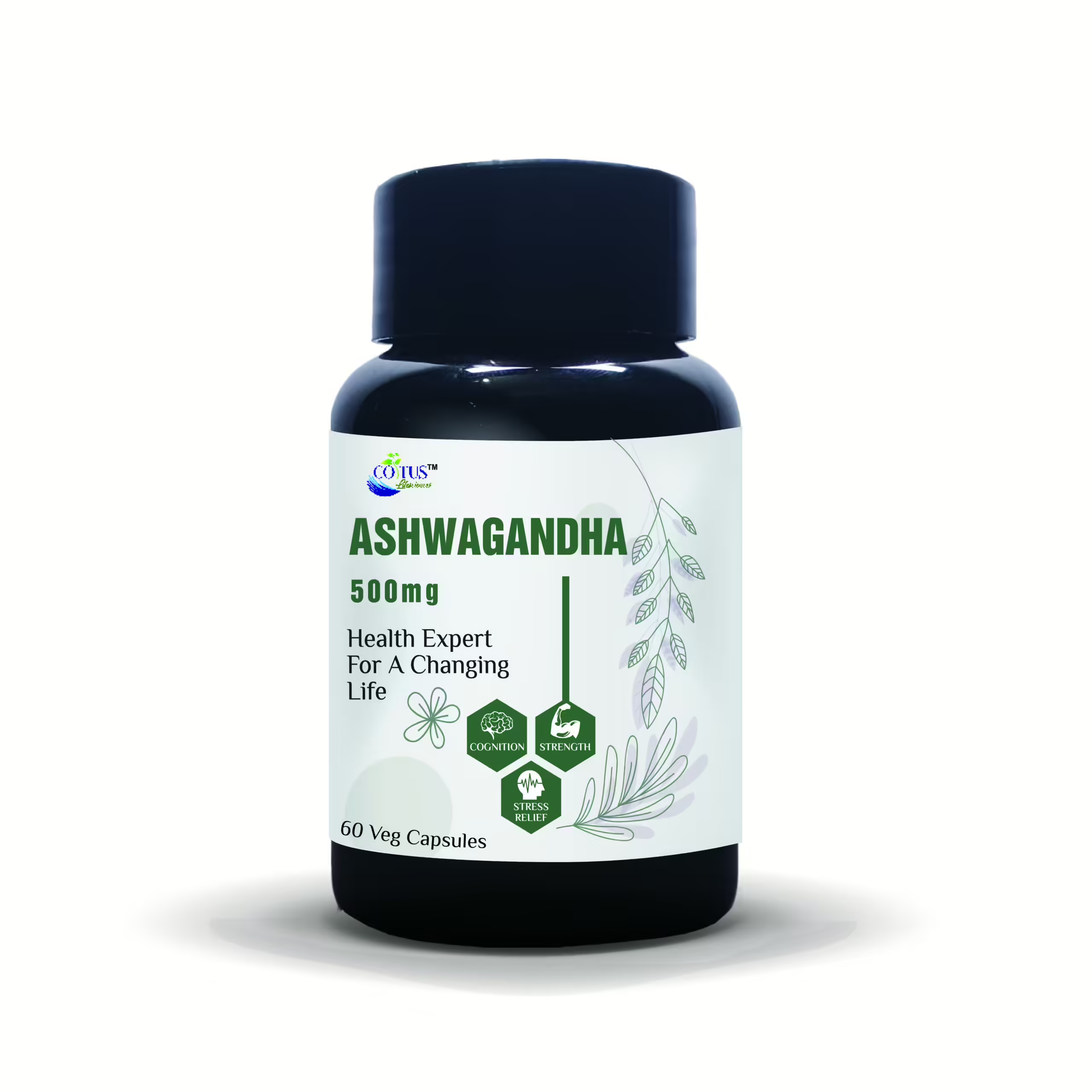
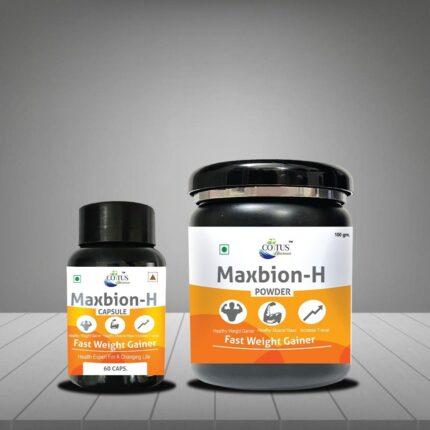
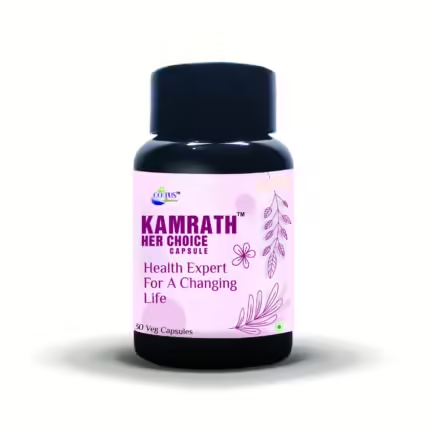
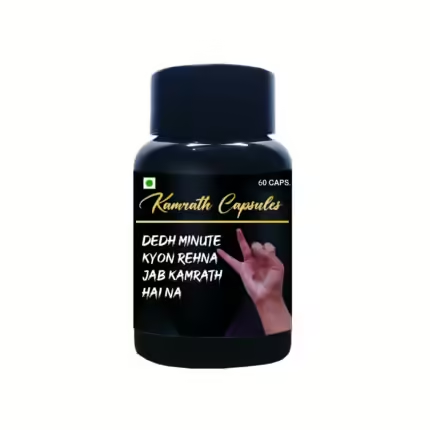
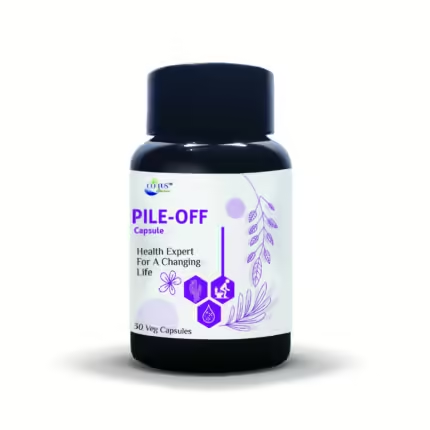



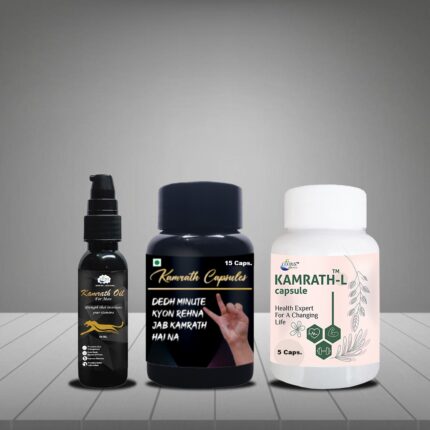
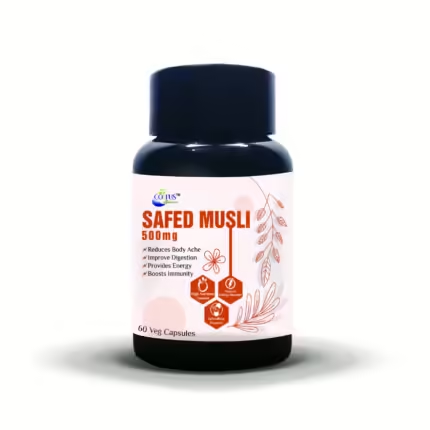


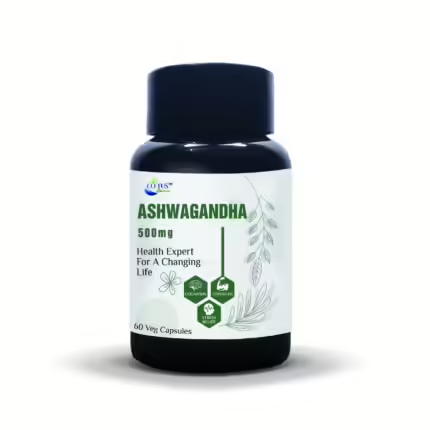
Reviews
There are no reviews yet.